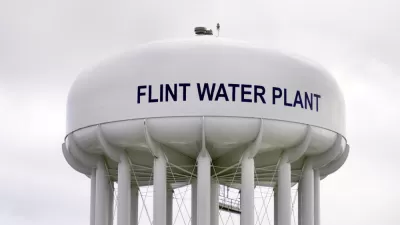There's good but guarded news on drinking water. Lead levels are lower, below the federal action threshold, but residents are advised not to drink it without using filters. A federal state of emergency in effect since January was lifted Sunday.

Researchers from Virginia Tech with Flint residents conducted 162 random sampling of drinking water obtained from Flint homes in July. Their findings for lead, Legionella, water heater study, and disinfection by-products were released August 11.
Good news!
"The 90th percentile level for lead was 13.9 ppb," reports Rebecca Williams, environment reporter for Michigan Radio, an NPR member station. "This is below the EPA action level of 15 ppb."
“Things are dramatically better now,” said Marc Edwards, the Virginia Tech environmental engineering professor who played a key role in bringing the lead crisis to the nation's attention last year.
By comparison, sampling in August, 2015 showed 28.7 ppb and results in March, 2016 were 22.5 ppb. [See slide 13, page 13/47.]
"This is nearing the end of the beginning of the end of the public health disaster response," said Edwards, a MacArthur Foundation fellow. "Flint water now looks like it’s entering a range that’s considered normal for other U.S. cities."
But before you drink the water....
"Kelsey Pieper, a postdoctoral fellow at Virginia Tech, said their sampling pool is a random sample of homes and does not specifically target the highest risk homes for lead," adds Williams. "So, while their results show the homes they tested are below the action level, it’s not an official result that would qualify under the EPA’s Lead and Copper Rule."
"Residents certainly should continue using bottled water and filters until notification from the Environmental Protection Agency or the state — no one is saying the water is safe," added Edwards in the Virginia Tech News.
End of federal state of emergency
"With the end of the emergency, the state will now be responsible for all the costs associated with getting clean water to Flint citizens and running the city's eight community stations (the federal government covered 75 percent of the costs, and the state was responsible for 25 percent during the January to August Federal State of Emergency)," reports the Detroit Metro Times. President Barack Obama had declared a state of emergency on January 16 in response to a request by Gov. Rick Snyder.
Roots of crisis
The lead crisis began when the state-appointed emergency manager for the city of 102,000, 57 percent African American, made the fateful decision in April 2014 by going off the Detroit drinking water system, which draws from Lake Huron and switch to the Flint River to save money, without adding an anti-corrosive ingredient. See Michigan Radio's timeline on the crisis beginning July 2011.
After switching back to Lake Huron water last October, Flint took the first step to alleviating the crisis by 'coating the pipes' with the "chemical phosphates that were missing from the water between April 2014 and October 2015, because of mistakes by the Michigan Department of Environmental Quality(MDEQ) and City of Flint," notes the January 30 post.
The lack of corrosion controls allowed corrosive Flint River water to carry away lead from pipes, joints and fixtures. Over time, Gov. Rick Snyder said, the phosphates will build up a protective coating between the pipes and the water they carry, making them capable of delivering safe drinking water.
Ongoing investigation
In April, two state officials in MDEQ and a Flint water plant administrator were criminally charged in the lead crisis. On July 29, six additional state employees were charged, reports CNN. "The allegations show a concerted effort to cover up warning signs of lead poisoning, according to prosecutors."
Lead pipe replacement?
"Many buildings and homes still have lead pipes, which health officials say need to be replaced, but that will take time," reports PBS. “It might very well, across the country, take 100 years before we get all the lead plumbing out,” said Edwards.
FULL STORY: Virginia Tech's latest Flint water tests: not safe to drink, but getting better

Planetizen Federal Action Tracker
A weekly monitor of how Trump’s orders and actions are impacting planners and planning in America.

Restaurant Patios Were a Pandemic Win — Why Were They so Hard to Keep?
Social distancing requirements and changes in travel patterns prompted cities to pilot new uses for street and sidewalk space. Then it got complicated.

Map: Where Senate Republicans Want to Sell Your Public Lands
For public land advocates, the Senate Republicans’ proposal to sell millions of acres of public land in the West is “the biggest fight of their careers.”

Maui's Vacation Rental Debate Turns Ugly
Verbal attacks, misinformation campaigns and fistfights plague a high-stakes debate to convert thousands of vacation rentals into long-term housing.

San Francisco Suspends Traffic Calming Amidst Record Deaths
Citing “a challenging fiscal landscape,” the city will cease the program on the heels of 42 traffic deaths, including 24 pedestrians.

California Homeless Arrests, Citations Spike After Ruling
An investigation reveals that anti-homeless actions increased up to 500% after Grants Pass v. Johnson — even in cities claiming no policy change.
Urban Design for Planners 1: Software Tools
This six-course series explores essential urban design concepts using open source software and equips planners with the tools they need to participate fully in the urban design process.
Planning for Universal Design
Learn the tools for implementing Universal Design in planning regulations.
Heyer Gruel & Associates PA
JM Goldson LLC
Custer County Colorado
City of Camden Redevelopment Agency
City of Astoria
Transportation Research & Education Center (TREC) at Portland State University
Camden Redevelopment Agency
City of Claremont
Municipality of Princeton (NJ)



























